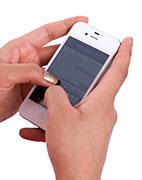- 10 Strategies to Overcome Insomnia
- Could Artificial Sweeteners Be Aging the Brain Faster?
- Techniques for Soothing Your Nervous System
- Does the Water in Your House Smell Funny? Here’s Why
- Can a Daily Dose of Apple Cider Vinegar Actually Aid Weight Loss?
- 6 Health Beverages That Can Actually Spike Your Blood Sugar
- Treatment Options for Social Anxiety Disorder
- Understanding the Connection Between Anxiety and Depression
- How Daily Prunes Can Influence Cholesterol and Inflammation
- When to Take B12 for Better Absorption and Energy
Could Your Smartphone Help Boost Your Heart Health?


Smartphones could become a high-tech tool to help boost heart health, experts say.
The apps and wearable sensors on many cellphones can track exercise, activity and heart rates, and while evidence of their effectiveness in reducing risk factors for heart disease and stroke is limited, they could prove useful, a new American Heart Association scientific statement said.
Currently, 20 percent of American adults use some type of technology to track their health data. The most popular health apps are associated with exercise, counting steps or tracking your heart rate, the heart association said.
The authors of the statement reviewed the small number of published, peer-reviewed studies about the effectiveness of mobile health technologies in managing weight, boosting physical activity, quitting smoking, and controlling high blood pressure, high cholesterol and diabetes.
“The fact that mobile health technologies haven’t been fully studied doesn’t mean that they are not effective. Self-monitoring is one of the core strategies for changing cardiovascular health behaviors,” statement lead author Lora Burke, professor of nursing and epidemiology, University of Pittsburgh, said in an AHA news release.
“If a mobile health technology, such as a smartphone app for self-monitoring diet, weight or physical activity, is helping you improve your behavior, then stick with it,” Burke added.
She and her colleagues found that people who used mobile technology as part of an overall weight-loss program had more short-term weight loss than those who tried to lose weight on their own.
Many studies found that people who used an online program for physical activity had larger increases in exercise than those who didn’t use such programs, but the effectiveness of wearable exercise monitoring devices was unclear.
The statement authors also found that the use of mobile phone apps that use text messaging to help people quit smoking nearly doubled the chances of quitting, but 90 percent of people who used these apps did not quit smoking after six months.
The statement was published Aug. 13 in the journal Circulation.
If you’re interested in trying a mobile health technology, Burke recommended talking to a health care provider, fitness instructor, registered dietitian or other expert to help find an effective program for your needs.
More information
The American Heart Association outlines how to reduce heart risks.
Source: HealthDay
Copyright © 2026 HealthDay. All rights reserved.










